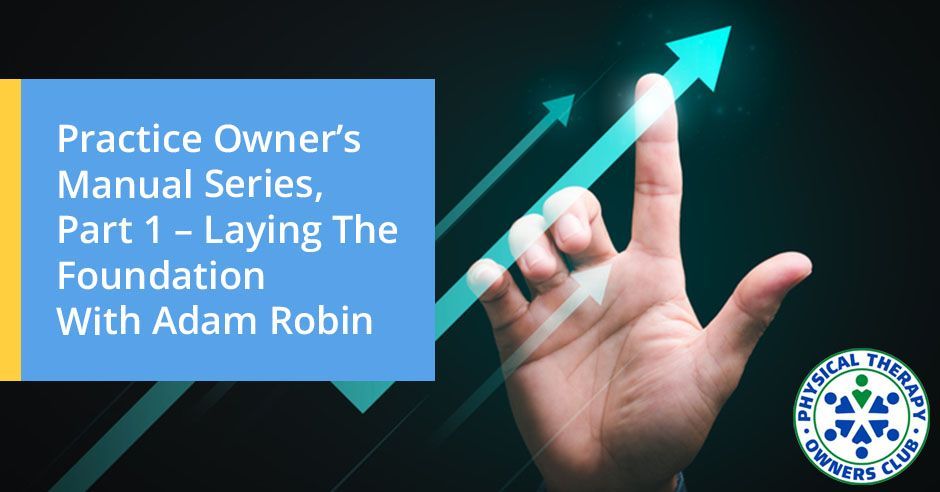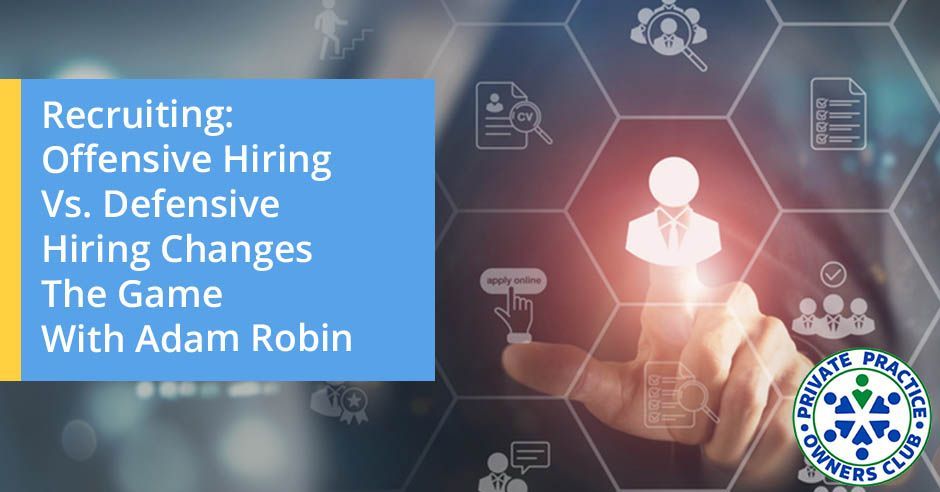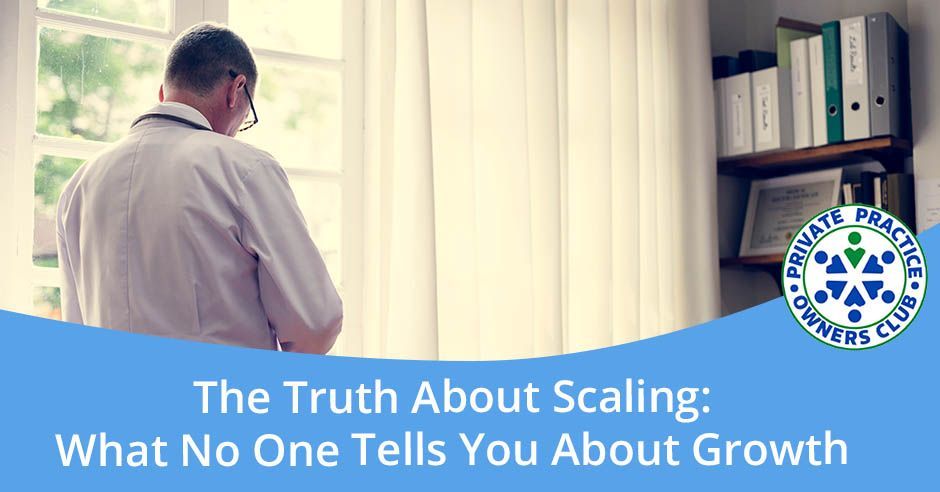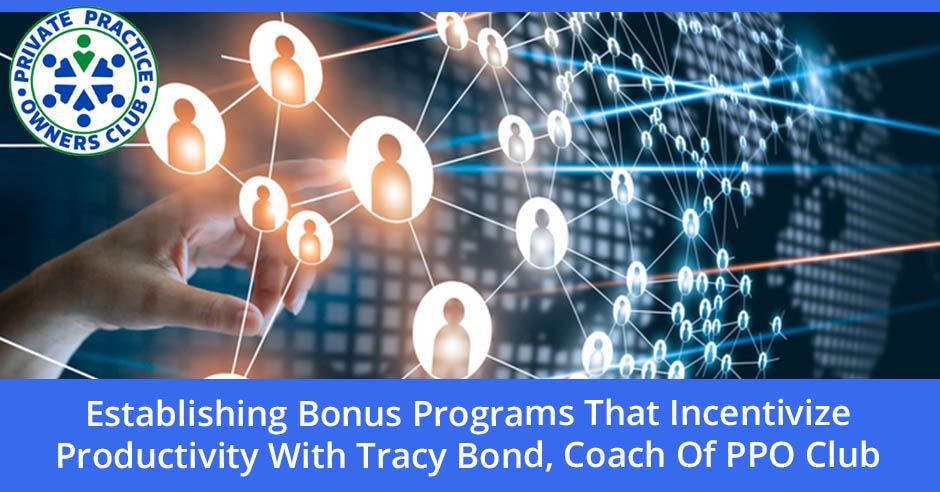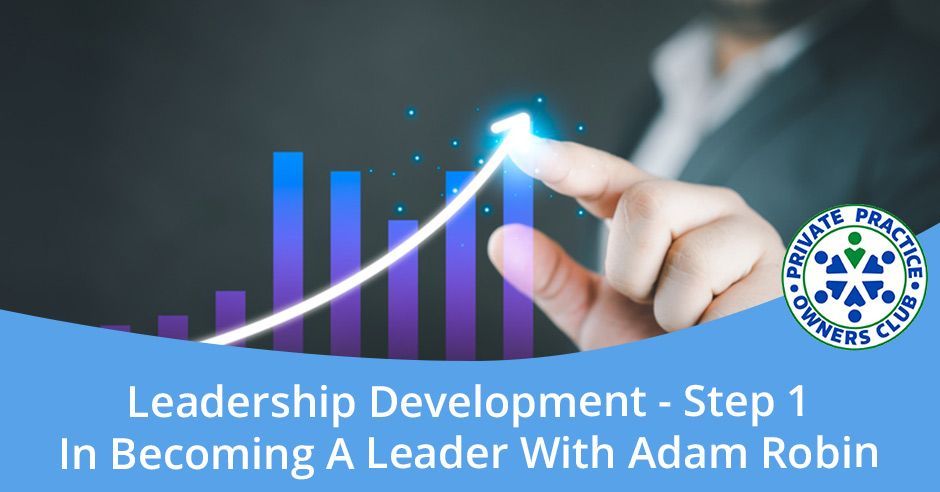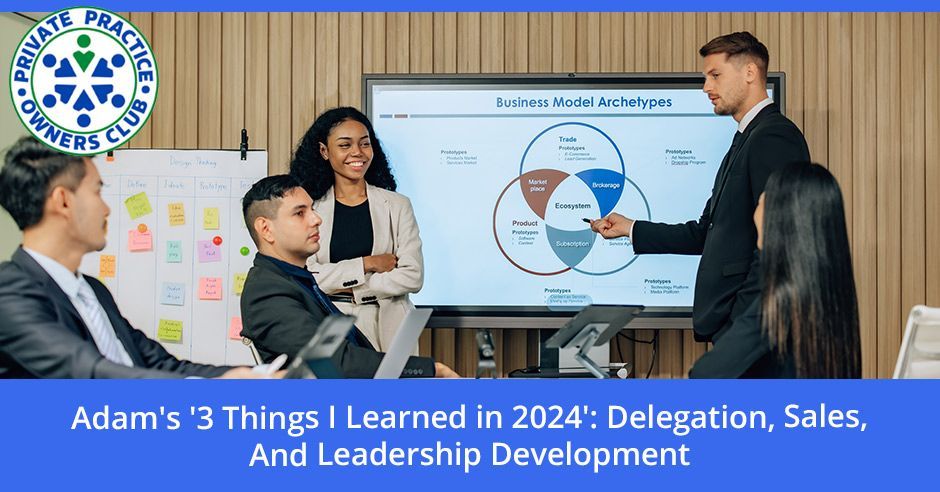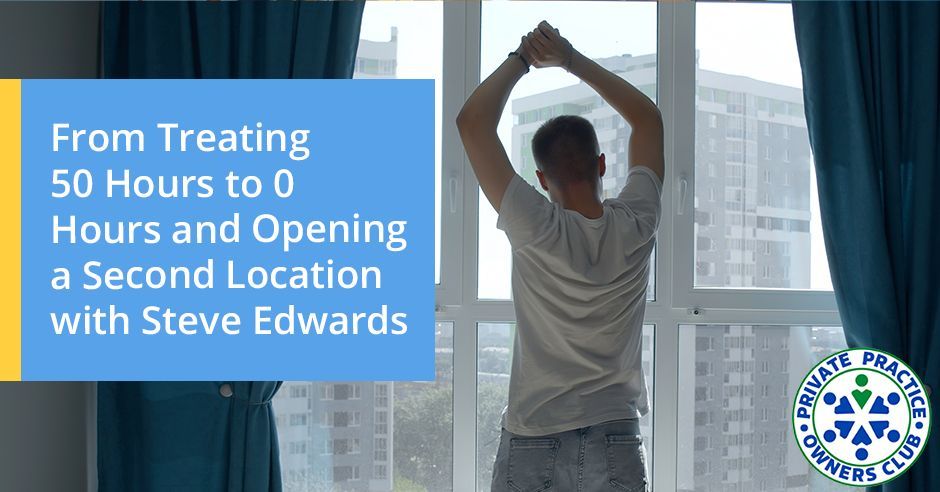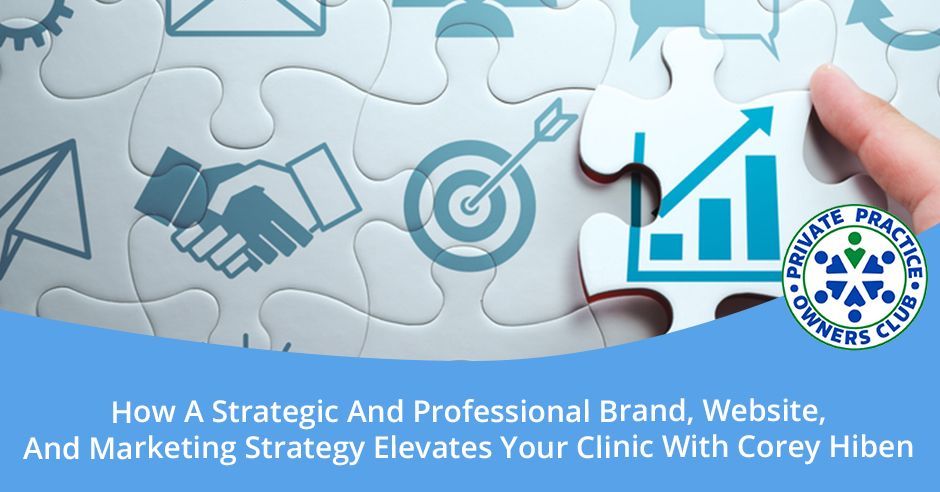In this episode, Nathan Shields collaborates with Adam Robin to launch a transformative series. Discover the essential elements every business owner needs, from physical therapists to plumbers, to establish a strong foundation.
In this discussion, Nathan and Adam thoroughly explore the significance of having a clear story, purpose, and values for your clinic. They provide practical advice on how to recognize and incorporate these fundamental elements to attract staff with similar values and cultivate a robust, unified culture. They also discuss the importance of sharing your personal journey, defining a purpose beyond daily operations, and establishing core values to guide decision-making and growth. This episode is filled with practical tips to help your business not only survive but thrive.
Are you ready to turn your physical therapy practice into a successful business? Learn the essential steps that will prepare you for success, regardless of your current challenges.
Want to talk about how we can help you with your PT business, or have a question you want to ask? Book a call with Nathan - https://calendly.com/ptoclub/discoverycall
Love the show? Subscribe, rate, review, and share! https://ptoclub.com/
---
Listen to the podcast here
Practice Owner’s Manual Series, Part 1 – Laying The Foundation With Adam Robin
Adam and I were talking about the topics that we should discuss on the show. An idea came to mind that maybe we should do a series of episodes specifically related to the development of a successful private practice, like, where do we start? How about marketing? How about hiring? How about recruiting? All laid out in a series so you don't have to jump around to different episodes that I've posted over the years, but rather laid out from soup to nuts, A to Z. A singular episode for every department of the business that you need to address. Put it all together in a series of consecutive episodes so that you have the quintessential bulletproof practice owner's manual for success.
This manual and these episodes follow the blueprint of our coaching program. Coaching clients have access to what we call the vault, which is a library of digital resources that Adam has created to help any owner who needs help in a particular aspect of their business to go there, learn about it, address it appropriately, and implement it into their practices. We just decided that maybe we'd add to that and provide these podcast episodes on top of it.
The final product of this series of episodes will look like this. We're going to have podcasts in order of the proper development of your practice, and YouTube videos in order as well that go in line with the podcast series. At the very end, a checklist of how to build a successful practice will be posted on the Facebook group. Join if you haven't joined the
Physical Therapy Owners Club. Also on our website when it's all completed,
PTOClub.com. The website is completed, but the series of episodes, once that's completed, that will be posted there as well. Look forward to that. In the meantime, enjoy this particular episode of our series of shows.
---
You got my buddy and partner,
Adam
Robin, on board. Thanks for joining me again.
Glad to be here.
Foundation Of Success
It's good to have you. It's been a little bit since we've come around to do some show, interviews just between the two of us to talk about important things but really excited about this series of podcast episodes that we're going to create because between this series of episodes, it should provide a very stable foundation off of which and structure off of which any physical therapist can build a successful physical therapy clinic. Is that the same vision that you have?
Yeah, I would say you can even just broaden it to anybody who wants to run a business whether you're an occupational therapist, speech therapist, chiropractor, physician, plumber, or electrician, like we're going to lay out the fundamental elements of what like every single section of your business and give you some I guess like chapters to your owner's manual. This is definitely a series of like, you should have a pinout, you should have a piece of paper out, write these things down. If you plug these things into your business, it's impossible for you not to have success with it.
Consuming Content Effectively
That was going to be my next question. How would you recommend people consume these episodes? Pen and paper, for sure. A lot of them might be driving so maybe you can listen to it initially but maybe come back around and listen to it again with pen and paper or make some notes when you stop. How do you recommend people consume and make sure they implement?
I would say you should walk away with something that you're going to commit to implementing every single episode, at least one thing. If you implement these things, each of these, I think there's going to be about 10 or 12 episodes. If you implement at least one thing from each episode, you will massively improve your business. I would recommend pen and paper. Then identify one key thing from each episode that's really just calling from calling you and implement it.
The tendency for a lot of physical therapists, because we tend to be perfectionists, is that I feel like, and I do this plenty of times as I'm listening to podcasts or read self-help books, I've got to implement it all in order to move on to the next thing. You're saying hey just pick something that either you're like, “Yeah, I need to work on that,” or I even recommend if something looks like, “I know I need to do that, but I'm kind of scared.” That's probably the thing that you need to address and just focus on that one thing and focus on that. Not do all 3, 4, 5 things. Just take one thing, focus on it, and move on to the next. Otherwise, you're just going to get stuck, bogged down, burned out, you name it. You don't make any traction.
That's right. If you want to run a marathon, you don't go out and run a marathon. You go for a walk. On day one, you go for a walk. You know what I mean? Then the next day, you go for a little longer walk. Then the next day you go for a light jog, and then you build it. Find one little small win you can have, have some fun with it, celebrate, and then on to the next one.
Find one little win, have some fun with it, celebrate, and then on to the next one.
Even consider this, that maybe this is in a library of episodes that you come back to, say in another six months or maybe once a year you re-listen to it. Hopefully, that's how we're packaging it and presenting it to the audience that these are timeless and that you can come back to them and find nuggets within it depending on the perspective and the situation that you are in, in your business. Let's start off. What's number one?
Building A Strong Foundation
Number one, chapter one of your owner's manual. You have a piece of paper right now. Everybody, have a piece of paper. There's a pen in your hand and at the top I want you to write Owner's Manual and underline it in all caps. Chapter One is Building the Foundation. What we want to talk about today is understanding your story, understanding your purpose, understanding the values of your company creating the identity of your company and this is going to be one of those things where it's like, “I don't want to do that. That sounds boring. I just want to make some money.”
“I want more patients.”
It's like, “Do you want to be an owner or not?” Listen to me. This is something you're going to have to commit to, and it doesn't have to take a year. Like give me a couple of weeks and just focus on this, build this out, share it with your team, and start actually trying to live this, and then you'll definitely have a positive impact on your business.
Importance Of Sharing Your Story
You talk about story, and maybe we're going to talk about a little bit more in detail here, but I always considered, I looked at my story, I'm like, “My story is nothing special. Why would I bother highlighting that? Why would I bother telling people that?” 1) People love stories. 2) If they're working for you, your team wants to know where you're coming from. Why did you do this? Did you have some hiccups along the way?
Did you have an inspiration? Did you have an injury that you came back from? Was there a mentor? Was there someone you'd love that you thought, “I want to do that with people because I saw my loved one get treated in an appropriate way and see significant gains?” Did you have an experience, etc.? Everyone has a unique story that led to their opening up of their business. It's imperative that their team knows that so that they can understand your inspiration.
It doesn't have to be glamorous. It can be really simple. Mine, I would say I don't want to take the time to share it, but it's rather simple and it's not life. It was life-changing to make the decision to go into business, and maybe that's another reason why you need to share it because this is a life-changing event. I sacrifice a lot of time and money to build this business. This is where I'm coming from.
I think one of the most powerful things I've ever done is share my story with my team, and sometimes it gets emotional. Not everybody's story is so happy. A lot of times your story comes from past pain. A big challenge that you overcame. People's story, from my experience, people's story sounds something like, “I was happy, and I was fulfilled with this thing, and then I lost it all. I lost my identity, I lost my way, I was lost, I was overwhelmed, I was anxious, I was depressed, I was not happy.
Then I met, or I was, then I experienced blank. I met the savior, I met the hero, I met a person, or I was exposed to my church or my pastor. He pulled me out of the weeds and helped me overcome things. Now I'm super happy, and I'm back on top of the mountain.” Your story is typically, “I want to help others experience their version of that. I want to see others overcome those challenges. I want to help them in that way.”
It takes some reflection. A lot of times it takes the work of a coach to help you kind of pull that story out, but sit down and just kind of reflect on your story and reflect some of the painful things that you went through along your journey and reflect on how you overcame them. Who helped you overcome them? What new realizations did you have? If you can start getting clear on what that story is, it could be a really powerful culture builder for you and your team.
You're explaining the hero's journey, and I'm trying to reflect on my own story, and it doesn't replicate that. It was simply I had some peripheral experience with physical therapy, seeing how other people go through it. I was thinking about healthcare in general. Then I did a volunteer, like just observation at a couple of physical therapy clinics. Every time I left, I was excited, like an adrenaline rush, loved it. I'm like, “Maybe this is telling me something, I guess I'll pursue it.” It was rather simple.
Then, when it comes to opening up a business, that's a different story, that's another story, but you would add that on top of it. That got me into physical therapy. This journey got me into ownership. Talking about that, as you were talking one client's story stood out as unique in that he got into physical therapy because he likes doing puzzles. He found that as he was working with patients, they were like a puzzle.
He's trying to figure them out with all the different special tests and range of motion measures and strength measures and trying to put all this together to find out the solution to their problem. Thus, he wanted to open up a physical therapy clinic. He wanted to see the hardest spine patients that were out there, the most complicated patients because those were the most complicated puzzles to solve. That's your purpose. I mean, you got to weave that in.
That's amazing.
Isn't that cool? Weave that in to let your team know that, why you want to see these patients. I mean, you're out there marketing to see these complicated back patients. Your team better know that you're marketing for complicated back patients, if they're going to be aligned to that kind of patient population and wanting to treat them. It can be simple things, and it just took a little bit of work for us to have that conversation with him to pull out that story. He didn't see that connection before I was able to be a third party to it and share that with him.
Another way that it's been described to me is, “Sometimes your story can come from past pain, and sometimes your story can come from what you stand for.” It's like I took a stand for something. I decided that I wanted to take it. I wanted to take a stand-up like I was going to help people solve their puzzles. I was going to take a stand on what was important to me. Another way that can spark some brain juice to help you open up some clarity around this is what do you stand against? It's like I stand against blank. I will not tolerate blank. I will not be this. That can help you uncover what's important to you.
That doesn't have to take a lot of time. You share that, you put it out, maybe you put a little thought into it and just have a story, but that's something that if it's a captivating story, like Will Humphries has a captivating story. If it's a captivating story, you want to broadcast that all over the place because you will be remembered for that story and people will be drawn to you because of your story. You want that. You want people to be drawn to you. You want to work with like-minded people. If it ignited a spark in you, and it ignites a spark in them, more than likely you're going to be aligned at a basic level and probably have some value alignment at least to build off of. It's important to share. We got through the story. What's next?
You want people to be drawn to you. You want to work with like-minded people.
Defining Purpose
Purpose. Your purpose is what you do. What do you do? More specifically, like, what are you committed to? I just had a, I'm going to shout out, maybe I won't. I just had a coaching client that I was working with earlier today. We've been talking about purpose for three weeks. I said, “What do you do? What do you do here? What do you do with this company?” He's like, “We're trying to help people feel better. We're trying to help people experience fulfillment.” He kept throwing some words. There was a lot of lack of clarity.
He's like, “One thing that we do in the eval is we help people reach their ultimate goal.” I was like, “Tell me about that.” He said, “We use the language of like, we help people reach their ultimate goal, which is we turn their dreams into realities. If they have a dream of like, “I want to go for a walk with my dog three days a week around the park.” We turn that into a reality. We call that the ultimate goal.” I was like, “Stop right there.” There's your purpose. That's your why. It's like, that's what you do. We help people and I've got it written right here. We help people turn their dreams into possibilities. It's like, it has nothing to do with physical therapy. It has nothing to do with what you do as far as it cuts the fine line.
Nothing technical.
It's typically related to how you want to impact the world, how you want to be seen in the world, and what you want to be known for in the world. This is something that you not only bring to your team, and your patients but bring to your families. You bring to your community, bring to your referral partners, you bring to your little kids, little league soccer game, and you're talking to the moms and dads that are sitting around you. You live that. You live that purpose. When you can identify that, you get that written down, and you link that to your story. Boom, now you're starting to create an identity. You're trying to create an identity and that's going to be the catalyst to your culture.
I was going to say, heaven forbid you start a culture. What? No way. This is where it starts.
This is what you do.
It's so funny because when you're a singular practitioner, you and the business are one. You're the sole provider, you might have a tech or a PTA front desk person, but you are the main thing, you're the owner and provider. That is the culture, it all revolves around you. If you have any folks for growth and to build a culture, a culture that you want and that you have some control of and that you're intentional about, it starts with these items. This is how you build a great team, is through having a story and a purpose, and we're going to talk about values.
It's having these things in place off of which to attract like-minded people. I used to send the Ted talk of Simon Sinek, I think it kind of catapulted him was his talk about the why. I probably sent it to you back in the day before our first coaching visit years ago. Watch the Simon Sinek video that Ted talked about. It starts with why. He'll explain to you exactly what this is. The why and the purpose are essentially the same thing. It has nothing to do with what you do. It has everything to do with why you're in existence.
Let's say it this way, if you have a bad purpose, if it says anything about the therapy that you provide, “We provide the most hands-on care, the most individualized physical therapy in the community, serving our clients, we provide a holistic approach to the care.” That's what you do. That's not your why. That's not your purpose. That's not why it exists. The purpose is your why such that people can say, “I can agree with that. Now, what do you do?” If people were like it could be an elevator pitch.
You meet someone in the elevator, never know, they're a stranger and they say, “What do you do?” “Back in the day, our purpose was to help others rise above. We help others rise above.” “What do you mean by that?” “We are a physical therapy clinic that helps people rise above, whether that's our patients, our clients, our vendors, we don't care. We want to help others rise above throughout the community, everyone we touch.” That gives people a picture, it gives them a painting of exactly who you are and what you're set out to do. It makes it really easy then after that point to get other people in line with you.
We'll talk about values here in a second, but your story, your purpose, your values, it's a document that just keeps breathing. It keeps growing. It keeps evolving. As you grow and learn and evolve, it's like as you expand the way that you think about how to serve people and who you want to be, and your team grows, and you start adding team members, it's like that grows with you. I love that. Right now, you should have a piece of paper, page one should say your story and you should write that down.
Establishing Values
Put some language to it, 100 to 200 words, something you can share in about three minutes. Turn the page over, now you're going to start defining what your purpose is. What is your purpose? Personal purpose what's the impact that you want to make on the world? Right underneath that, we're going to define the third pillar of your culture, which is your values. I'm not an expert on many things, but the simple way that I kind of define the values is this is how we do it. The purpose is like, this is what you do.
The purpose is why you do it.
Sorry. Why you do it? The values are, this is how you do it. This is how we conduct our business. These are going to be 3 to 5, maybe 7 personality describers that are going to be used to define the perfect personality inside your business. Who are we called to be? How do we behave? How do we behave here? Everybody's kind of seen values, you might be accountability, integrity, professionalism, gratitude, or grit. There are some defining characteristics that are going to trump all others.
That's going to determine a lot of things, including the people that you bring on your team must be value-aligned, higher based on these, fire based on these, you create your policies and procedures based on these. You mark it based on these. Going back to the same client I was talking with today, I asked him a question, I said, “What was one thing you learned about yourself over the last two weeks?” He said, “I learned that the decisions that I make are going to the thing that directly grows the company.” I said, “Let's talk about that.”
My favorite word there is decisions. How do you define your decisions? How does that happen? Like, how do you get to your decisions? We peeled back the layers, and it came down to like, “We use our values to drive decision-making in this organization.” Our values drive your decisions. If your values are clear, your decisions will be clear, your team's decisions will be clear, and your leadership team's decisions will be clear. The degree that you can get clear on your values and how you want to behave will impact your culture tremendously.
Again, I want to come back to people who are listening because you put it out there at the beginning, I just want more new patients, I want to know how to deal with these employees who are not acting appropriately, I want to drive productivity, my stats are going down. This is something I learned from Eric Miller of Econologics. The first step when you're in the middle of a cash flow crunch, numbers are going down, and you're worried about cash is to revisit your purpose and values. Start there. Where are we going wrong?
The first step when you're in the middle of a cash flow crunch, numbers are going down and you're worried about cash, is to revisit your purpose and values.
Establishing Culture
What are we not living up to that we said that we would? Let's start there, and that's a team-wide experience. It's not just the owner. The owner needs to self-reflect as well, but it goes back to that. Let's focus on purpose and values. Then we can start doing some digging after that, but this is the importance of this exercise. It's not just set and done starting my business. I do these things because Adam and Nathan said so. Put it on the shelf and now we're done. No, to go back to what you're talking about, a purpose and value-driven company is a company that has an intentional established culture that is replicable and attracts like-minded individuals who will easily fit in that culture and be happy to produce.
Building a culture like that brings on people who eventually love your company like family. That's what you want. You want them to love what you've built because you love it. Start with values. It can be daunting to think of how do I start with values. I have some, I think they're great words, but the exercise that we went through was, what kind of companies do you respect? What are they known for? Why do you visit them versus the other companies? Why do you drive past five McDonald's to go to Burger King? What does Burger King do that the five McDonald's don't?
That's the idea. Why do I go to Sprouts or Trader Joe's instead of the other grocery stores in town because they provide what? What is that experience that they provide? What do they provide that you like? There could be a value for you to find within that. What are some of the characteristics you want to be known for? Maybe you don't exemplify them right now, but you have mentors and idols and family members that you look up to that have certain characteristics that you want to emulate. Let's start writing these down. Some of these characteristics start writing down.
What do you want to be known for? What do you like? What do you see? What do you see in other companies that you want to be like? The values are not just how we do things. They're also what we are known for. We are known for these things. Will and I initially did this the first time, and it was surprising how fun the experience was because it was just the two of us, and we had conversations about all these. We came up with a list of about 20 words. After that, we'd get the list of 20, 25. After that, we'd go one by one and just say, “Do we want this one? Or is that rolled up in another word that we said? Is it duplicitous?”
We cross off one or the other. We pine it down and pair it down to about maybe 8 to 10 values. At that point, it was a conversation like, “Let's have a serious conversation. Which values do we prioritize over the others, and why? What are some of our definitions for these values?” Even though you say the word, the definition could be different between the two of us. You could be envisioning one definition where I envision another. You need to get clear on what the definitions of those are. After doing that for a little bit, then you might have to have some serious dialogue. I don't know. What would you say it takes maybe about an hour?
Yeah.
To a few involved, maybe a group.
I was going to say, to me, it's helpful to have another member of your team co-create this with somebody on your team. The best cultures are co-created. It opens up more conversation. In my opinion, you get there a little bit quicker. I work better that way, as opposed to just kind of staring at a blank piece of paper because what you don't want to do is create the Adam show. You don't want to create the Adam show. You don't want to create the Nathan Show. You want to create your company show. In order to do that, you need to have input from people in your company.
What the cool thing is about involving other people on your team is that they might call out values that don't readily come to mind, just because you're living in them all the time. When I say, “What are n for?” My team would be able to say blank right away. I'm like, “That's how you guys see me?” It's nice to have that third-party perspective. That's like, “You don't see that, Nathan? That's what you do all day long.” I guess that's one of our values. Let's throw it up on the board and have a discussion about it. It is good to have that input from people on your team because some of the values they easily see.
At this point, for the audience, we've got our story written out. Page two is we've got our purpose. Underneath that, we've got our values with maybe some definitions behind them that define who we are and what we want to be known for. At that point, you've got a strong foundation. Document it, it's in your owner's manual. It's got to be documented.
Can I say something really quick?
For sure.
Definitions Matter
It was one thing for us to find the values. The second part of that that you said was related to definitions. It became much more powerful once we defined the words and we had a standard definition. We tried to make it as easy to remember as possible, just like a single sentence. If I can give an example, professionalism. Do what we say what we're going to do when we say we're going to do it. I'm getting that one mixed up with another one, but nonetheless, you get the idea.
We wanted it such that if a stranger came into our clinic and picked anybody at random and said, “What are the values of your company?” They'd be able to rattle off professionalism, accountability, growth, and empathy. They should know them by heart. What do you mean by professionalism? They'd say, “Do what you say that you're going to do when you say you're going to do it.”
“What about accountability?” Blankety blank. Growth, blankety-blank. That took our culture just another notch up when people both knew the values and knew their definitions so that they were clear on what we were talking about. That would create a little bit broader conversation. People might want to stew in the values that you decide upon before you come back next time and decide what the definitions are, but I think that was a valuable experience for us.
To me, as I grow and evolve as a person, I'm getting involved in new things and doing the coaching thing, and it's like, I continue to find a deeper and deeper appreciation for purpose and values. It continues to show up over and over and over.
Especially if you're recruiting, if you're hiring.
Recruiting, hiring, all of it, sales, negotiations, it's all there. What I've also found, Nathan, is as my company has grown, I have spent more and more time on my purpose and values. I've spent more time and focus on it. We talk about values every week in our meetings, every single week. I'm continuously redefining, not necessarily redefining, but digging more to get more clarity on who we are and what we want to be known for. That's the CEO's job. That's their job. If there are three things that you do, one of them is definitely culture. That's your job.
You are the tip of the spear there.
Rising Above The Competition
You're the very tip. It's really important. Got a few other things I want to share about purpose and values. I have made a mistake. Let me back up. The game is if you want to separate yourself from your competition, if you want to be a beacon of light in your community if you want a practice that attracts patients, referrals, and employees, if you want everything you want, you want freedom and more money, focus less on what you do and focus more on who you are. Focus more on who your company is. Focus more on your culture. That will be the thing that separates you, that creates your identity.
There's nobody in the world who's going to be better at your identity than you, nobody, nobody in the world. You instantly create a niche that nobody can replicate. The clearer you can get on your identity, the more you're going to stand out. If you have three PT clinics in a row, it's going to be like, clinic number one, “We do dry needling and massage.” Clinic number two is like, “We do massage too, but it's better than their massage and we also do dry needling. We do better.” Clinic number three is like, “We're a group of leaders, and we're committed to helping people rise above.” It's like, “Wow.”
That's different.
Tell me more about that. You know what I mean? Tell me more about that.
The other two have just commoditized themselves.
Focus more on who you are instead of what you do. When I say focus on who you are, I don't mean from 9:00 to 5:00, I mean at home on the weekends, with your kids, with your spouse, at church, everywhere. You're living your purpose everywhere. The degree to which you can live that and align with that very good, like at a level that most people cannot, will be the thing that drives success in your business. Decisions get more clear, quicker. You stand out more. You hire more people, your marketing improves, and everything improves when you get clear on who you are as a company, and what your identity is, and you live it unapologetically. Big point there.
That was a huge win for me. It was a point in my business career in which things pivoted was reading business books. Never touched a business book for about ten years of business ownership and then decided to, I don't know how I came across
Good to Great. It’s the first business book I read. Blown away by the first sentence. Good is the enemy of great. I read that, and I was mind blown, “That's me. I need to read more of this, and I need to do better.” I was ready to go. That definitely changed my trajectory.
Implemented a lot of things that I read about, and improved my life. That also led me to read some self-help books that were influential because tell me the line at which you'd leave everything at the door and once you cross into your clinic. I mean, do you really drop everything that's going on in your personal life, forget everything, and then walk off the threshold, and you're like, “I'm a different person now.”
You shouldn't expect that out of your team. They bring their lives with them into the clinic and that's okay as long as their value align in their actions. I mean, there's going to be ups and downs. There are going to be emotional things that you bring in across, I mean, it doesn't just get wiped away clean. The same thing can be said for what you're learning, your attitude, your capabilities, your ability, what you're talking about, and who you are doesn't stop at the door. You need to improve that. Like you said, not just during work hours, but throughout your life.
Recruitment And Culture
Not just when it's convenient either, even when it's hard. Even when it’s like, “You want to grow a business?” Get crazy about your purpose and values and your identity and live it, live it hard. Live it like it's the most important thing. People will be blown away by you. People will want to work with you. Recruiting is a topic that everybody in our program is hiring therapists. There's not a single person in our program who has a recruiting problem at this point.
How many times have you heard, therapists, all these new grads these days, they just want a bunch of money, and they don't want to work hard? It's like, “No, you don't know what your culture is.” Do you know what I mean? You don't know your purpose and values, and you haven't articulated it. You don't have a compelling vision. You don't have a compelling story. People don't want to follow you. All those problems are mitigated by cultural work.
Getting clear on exactly what you're selling.
I'm learning. I got a nugget from you because earlier you said people tell you how they perceive you and that's eye-opening to you. I had the same experience recently about how I'm perceived. What I'm learning is people perceive me as somebody with a lot of energy and somebody who just goes all the time. I was like, “Thank you. That's super helpful.” I'm very clear that not everybody wants to listen to what I have to say. I'm okay with that. I'm not talking to you.
I love you, and I wish you nothing but the best but like, “I'm not talking to you. I'm talking to my people.” You know what I mean? When I can step into that place of really speaking to my people like, “I know who I am, and I know what I stand for. I know what my story is. I know what my values are and I speak it boldly and unapologetically. The people who are right for me are running. They come out of the woodwork. Employees, referrals, everybody.” It's a topic that I'm really passionate about. That's why I go on those little tangents, but all that to say, “You could probably make a little money without some purpose and values, but you cannot grow a business”
You could probably make a little money without a clear purpose or defined values, but you can't grow a business.
It's hard to expand.
Really hard to expand, really hard to create something scalable.
That's true. I think it's a John Maxwell quote and I don't want to misappropriate it, Brené Brown shares that daring greatly is a culture eats strategy for breakfast. Culture trumps it.
At that point, I feel what a foundation. Something that you could share with your team, something that actually means something, something that will allow them to get connected to like the heartbeat of you so that it's not just about another unit or another visit or another 40 hours of work. It's about something bigger. That will be the thing that keeps them there? That'll be the thing that's like, “I will run through a wall for Nathan Shields. I love that guy. I just believe in him. He's inspiring.” You have your own owner's manual now.
This is just chapter one.
Chapter one, don't skip this. If you have this, pull it back out. If you haven't done this in a while, pull it back out, redefine it. Maybe you haven't fully committed to a few of them. Maybe you and your team haven't fully committed to some of the values, maybe they need to be revisited. Maybe some of them are no longer applicable. Maybe you need to change them, but I would challenge you to really prioritize this, get clear on what this is, and plug this into your business. I promise you, you will not regret it.
Once you have them, and if you do have them, it is worth revisiting and saying, “Are we living up to these?” If you feel like your purpose is pretty clear according to what we laid out, it's a wise statement just like Simon Sinek would have described, and you feel like you have some values. Now, are we living up to these values? How could we improve them? That's worth an annual exercise.
How can we bring this to our families? How can we bring this to our teens' families? The tech, the other OT, and the other clinic, how can we help her bring this to their family? Let's go big with it. Focus on that. It's important.
Do you want to give a little bit of a snapshot of what we might be talking about next chapter?
Next week, I promise we're going to talk about business stuff. We're going to be talking about a little bit, we're going to touch on time and attention mastery. We're going to talk about some habits that you need to develop in your work routine as a CEO.
Some time management.
Some time management pieces. After that, we're going to start talking about some financials. Then we're going to get into marketing sales, front desk, practice management, recruiting, and we're going to do all kinds of fun stuff.
I'm looking forward to it. If you want to reach out to either one of us, questions about this episode or others,
Nathan@PTOClub.com,
Adam@PTOClub.com, or check out the website,
PTOClub.com, to see what we're offering. You'll find the episodes there. You'll find a little snapshot of what we're doing as far as coaching, and you can book a call with us to talk about your business as well. Feel free to reach out to us or send us or check out our website. We also have a
Facebook group. Don't forget the Facebook group. Sign up for that at the Physical Therapy Owners Club. Thanks for your time.
Thanks. I appreciate it.
It’s a great place to start.
I'll be in touch until next time.
Sounds good. See you.



